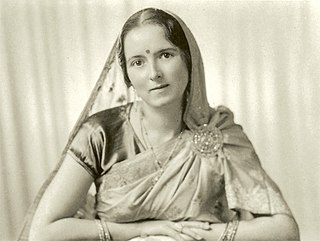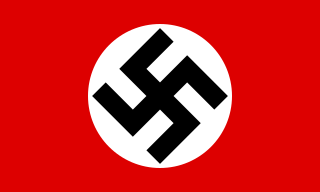Neo-Nazism comprises the post–World War II militant, social, and political movements that seek to revive and reinstate Nazi ideology. Neo-Nazis employ their ideology to promote hatred and racial supremacy, to attack racial and ethnic minorities, and in some cases to create a fascist state.

George Lincoln Rockwell was an American fascist activist and founder of the American Nazi Party. He later became a major figure in the Neo-Nazi movement in the United States, and his beliefs, strategies, and writings have continued to influence many white supremacists and Neo-Nazis.

The American Nazi Party (ANP) is an American far-right and neo-Nazi political party founded by George Lincoln Rockwell and headquartered in Arlington, Virginia. The organization was originally named the World Union of Free Enterprise National Socialists (WUFENS), a name to denote opposition to state ownership of property, the same year—it was renamed the American Nazi Party in order to attract 'maximum media attention'. Since the late 1960s, a number of small groups have used the name "American Nazi Party" with most being independent of each other and disbanding before the 21st century. The party is based largely upon the ideals and policies of Adolf Hitler's Nazi Party in Germany during the Nazi era, and embraced its uniforms and iconography.
National Socialist Party most often refers to the National Socialist German Workers' Party, commonly known as the Nazi Party, which existed in Germany between 1920 and 1945 and ruled the country from 1933 to 1945. However, similar names have also been used by a number of other political parties around the world, with various ideologies, some related and some unrelated to the NSDAP.

Savitri Devi Mukherji was a French-born Greek fascist, Nazi sympathizer, and spy who served the Axis powers by committing acts of espionage against the Allied forces in India. She was later a leading member of the Neo-Nazi underground during the 1960s.
Matthias Koehl Jr. was an American marine, neo-Nazi politician and writer. He succeeded George Lincoln Rockwell as the longest serving leader of the American Nazi Party, from 1967 to 2014.
Fascist symbolism is the use of certain images and symbols which are designed to represent aspects of fascism. These include national symbols of historical importance, goals, and political policies. The best-known are the fasces, which was the original symbol of fascism, and the swastika of Nazism.

Joseph Charles Tommasi was an American Neo-Nazi who founded the National Socialist Liberation Front. He advocated extremism and armed guerrilla warfare against the U.S. government and what he called its "Jewish power structure." Tommasi wanted anarchy and lawlessness so that the "system" could be attacked without protection. Tommasi was derisively nicknamed "Tomato Joe" by rival neo-Nazis because of his Italian heritage and "less than Nordic complexion." He was later expelled from the group for using drugs and misusing group funds.

Povl Heinrich Riis-Knudsen is a Danish neo-Nazi, prominent in the US as well as Denmark. Riis-Knudsen is known as the author of the articles National Socialism: A Left Wing Movement (1984) and National Socialism: The Biological World View (1987), as well as for having been involved with Matt Koehl of the American Nazi Party.

Movimiento Nacional Socialista de Chile was a political movement in Chile, during the Presidential Republic Era, which initially supported the ideas of Adolf Hitler, although it later moved towards a more local form of fascism. They were commonly known as Nacistas.
Harold Armstead Covington was an American neo-Nazi activist and writer. He advocated the creation of an "Aryan homeland" in the Pacific Northwest and was the founder of the Northwest Front (NF), a white separatist political movement that sought to create a white ethnostate.

The National Socialist Vanguard is a Neo-Nazi group founded in 1983 and led by Rick Cooper, based in The Dalles, Oregon, US, from about 1998. It has focused its efforts on recruiting high school students.
Falangism in Latin America has been a feature of political life since the 1930s as movements looked to the national syndicalist clerical fascism of the Spanish state and sought to apply it to other Spanish-speaking countries. From the mid-1930s, the Falange Exterior, effectively an overseas version of the Spanish Falange, was active throughout Latin America in order to drum up support among Hispanic communities. However, the ideas would soon permeate into indigenous political groups. The term "Falangism" should not be applied to the military dictatorships of such figures as Alfredo Stroessner, Augusto Pinochet and Rafael Trujillo because while these individuals often enjoyed close relations to Francisco Franco's Spain, their military nature and frequent lack of commitment to national syndicalism and the corporate state mean that they should not be classed as Falangist. The phenomenon can be seen in a number of movements both past and present.
The Canadian National Socialist Party, commonly known as the Canadian Nazi Party, existed from 1965 to 1978. It was led by William John Beattie, and was based in Toronto. It succeeded a separate, short-lived group also known as the Canadian Nazi Party that was led by André Bellefeuille and based in Quebec. It was affiliated with the World Union of National Socialists.

The National Socialist Liberation Front (NSLF) was originally established as a youth wing of the National Socialist White People's Party in 1969. In 1974 it was reconstituted as a separate neo-Nazi organization after its leader Joseph Tommasi had been expelled by NSWPP leader Matt Koehl.

The Rhodesian White People's Party (RWPP) was a Rhodesian neo-Nazi political party led by James Kenneth "Ken" Rodger and the organizing secretary Frederick Lewis. The movement was founded in Bulawayo on 30 January 1976; it mainly inspired the American Nazi Party and later with it the National Socialist White People's Party to prevent the black rule in Rhodesia. It was outlawed in November 1976 by the government of Ian Smith for anti-Semitic incidents by US citizens who were members of the party against the Bulawayo Hebrew Congregation. Among the expelled citizens were the neo-Nazis Eric Thompson and Harold Covington. This political party was the only one of the World Union of National Socialists that was active in Africa. Its main activity was distributing Nazi literature and harassing Jews in the area. The group has been described by the Bishop Heinrich Karlen as having the "Nazi mentality of the superman."









